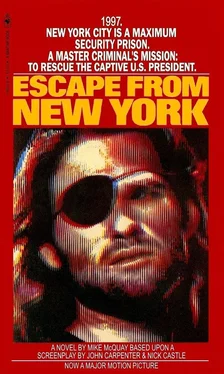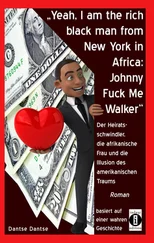Mike McQuay - Escape From New York
Здесь есть возможность читать онлайн «Mike McQuay - Escape From New York» весь текст электронной книги совершенно бесплатно (целиком полную версию без сокращений). В некоторых случаях можно слушать аудио, скачать через торрент в формате fb2 и присутствует краткое содержание. Жанр: Боевая фантастика, на английском языке. Описание произведения, (предисловие) а так же отзывы посетителей доступны на портале библиотеки ЛибКат.
- Название:Escape From New York
- Автор:
- Жанр:
- Год:неизвестен
- ISBN:нет данных
- Рейтинг книги:3 / 5. Голосов: 1
-
Избранное:Добавить в избранное
- Отзывы:
-
Ваша оценка:
- 60
- 1
- 2
- 3
- 4
- 5
Escape From New York: краткое содержание, описание и аннотация
Предлагаем к чтению аннотацию, описание, краткое содержание или предисловие (зависит от того, что написал сам автор книги «Escape From New York»). Если вы не нашли необходимую информацию о книге — напишите в комментариях, мы постараемся отыскать её.
Escape From New York — читать онлайн бесплатно полную книгу (весь текст) целиком
Ниже представлен текст книги, разбитый по страницам. Система сохранения места последней прочитанной страницы, позволяет с удобством читать онлайн бесплатно книгу «Escape From New York», без необходимости каждый раз заново искать на чём Вы остановились. Поставьте закладку, и сможете в любой момент перейти на страницу, на которой закончили чтение.
Интервал:
Закладка:
He tried to melt back into the shadows, rifle ready, but it didn’t matter; the man coming through the door was moving in the opposite direction. He was wearing a tattered top hat and tails. He wore no shirt, and his trousers were missing from the knees, trailing long stringy frays.
He wobbled as he walked, and was muttering under his breath. He flung the door wide and staggered off. Plissken grabbed the door before it closed and, hiding the rifle behind his back, moved into the building.
He was in the lobby of an old-time movie palace. Once a jewel, it was now a rhinestone. Its red carpeting was faded and water-damaged; the candy counter had been smashed to glittering slithers and long ago looted; its aquatint wallpaper was disfigured with large brown water rings and hand-painted obscenities. The lighting was dim; the gassy odor of kerosene lamps mixed with the carpet mildew to make the place smell like some sulphurous bog.
A small man wearing a filthy one-piece sat perched on a high stool near the door-the ticket-taker. His little round head was bent forward, lolling around on his chest. He snored lightly, easily. Plissken saluted him quietly and moved past him, toward the sounds.
He walked through the lobby, past the ragged curtains on the auditorium door and in. It was a big place, with enough seating for hundreds. The walls were lined with torches, big things with jumping orange fire on their ends and ugly black smoke curling from their tops. A hole had been cut through the ceiling to the outside to vent the smoke, and it rolled along the ceilings to tumble through the opening like a reverse drain.
Plissken looked at the stage. There was a chorus line of grizzled old men in outrageous female drag. They had linked arms and were kicking high as they sang:
“Happy days are here again.
The skies above are dear again.”
The band played in the orchestra pit, fiercely, intently: an out-of-tune piano, a section of jew’s harps, a few crudely fashioned stringed instruments that pounded out the sound. Off key, out of control, but music. It filled the hall, bottoming the singing voices, strengthened by the jumping feet that pounded the wooden stage.
“Let us sing a song of cheer again.
Happy days are here a-gainnnnnnn!”
He let his eyes rove the audience. There were about twenty of them-most of them were old, all of them out of luck. About half were asleep, heads rolled to the side, feet up over the seats in front. They looked comfortable, like they were born and raised right in those seats. The rest were shouting at the people on stage, laughing as they’d trip and fall. Their voices twisted with the singing, beating out the rhythm in time with the throbbing torches.
This wasn’t where the President was. Plissken looked some more. There was a man seated toward the back, listening intently, foot tapping with the beat. Almost like he felt the heat of that single, searing eye on his neck, he turned to stare at the Snake. His face was large, expansive, his hair thinned to nothing. His circumstances were apparently better than the others, because he wasn’t nearly as emaciated or dirty-looking. But that wasn’t the strange part. When he stared at Plissken, it seemed to the Snake that there was recognition in the man’s face. Some sort of familiarity.
The hint of a smile slowly seeped across the man’s face. Plissken tightened the slash of his mouth and started to move toward him, when a hard shot bolted pain through his shoulder.
He sagged with the blow, but didn’t go down. It wasn’t that hard. He came around to face it slowly, grimacing, keeping the gun behind him.
A large man stood before him. He was a bullet head: no neck, sloping, hairless skull. His eyes were dull, lips thick and twisting. He had a large, gnarled club in his hand that he kept slapping into the palm of his other hand. Splat. Splat.
Beside him stood the little man from the front door. And he looked scared, more scared of the man with the club than of Plissken.
“How’d you get in here?” the big man asked, and his eyes were two pissholes in a snow bank.
Plissken was rotating his shoulder, trying to work the pain out. “The front door,” he answered.
The big man turned to the ticket-taker, moving his whole body around as if his lack of a neck made it impossible to turn his head any other way. The little man was trembling.
“What the fuck is he doing in here, Boyle?”
Boyle gulped, eyes darting, looking for a way out. “Musta slipped by,” he said, just because it was all he could think to say.
The man with the club shook his head, his body turning with it as he did. Then, without warning, he swung out viciously with the thing, knocking Boyle to the ground.
“Okay, okay!” the man on the floor said, arms up to protect his face.
“Get back on that door!” the big man yelled, and the man crab-scurried across the floor back into the lobby. “You can be replaced, you know,” he called after him.
The big man turned back to Plissken and began beating the club against his hand again. “Two cans to see the show,” he said. “Three cans for a seat. Another can to sleep in it.” He held out his beefy paw, raising the club with the other. “No loitering.”
Plissken heard the homer beep and looked down at it. It was still pulsing, dead center in the dial. He brought the rifle up and jammed it in the big man’s stomach.
“You’ll have to excuse me,” he told him.
The man froze, club raised, like some statue in a horror wax museum. Jack the Bopper. Only his eyes moved, and they were cruising, running up and down the length of the barrel.
Plissken smiled quickly at him and moved into the shadows at the side of the auditorium. Keeping his eye on the big man, he moved down toward the front.
It didn’t make sense that the President would be kept here, but the homer kept contradicting his sense. He got up by the stage and turned his head toward it. When he turned back, the big man was gone. It didn’t matter.
He climbed the steps to the side of the stage. The old men were taking turns doing elaborate stripteases to some grind music coming from the Jew’s harps. They were intent upon what they were doing, deadly serious, fulfilling their avocation in life.
Plissken slipped around the worn maroon velvet of the stage curtain and worked his way around backstage. It was dark back there.
He got out the flash and slid the beam around. There was bare floor running back to a red brick wall. Toward the back, by the wall, was a stairwell leading down to a basement.
Moving to the stairs, he heard sounds. A faint light glowed from below, so he shut off the flash and started down the steep metal stairway. He kept an eye on the homer as he descended. If the thing was right, the President had to be in this cellar.
He heard a sound behind him and swung around with the rifle. The man from the auditorium was staring down at him from the top of the stairs. He had a rugged, ugly demeanor, and he grinned all the time. Plissken couldn’t tell if the grin was friendly or sadistic.
“You’re Snake Plissken, aren’t you?” the man asked him.
Plissken stared at him, tried to burn him with his eye. The man just grinned, showing a couple of missing teeth. He seemed to have a childlike way about him, an eagerness.
“What do you want?” Plissken asked in a monotone.
The man shrugged, with his arms and with his big, ugly face. “Nothing,” he said. Then his eyes narrowed. “I thought you were dead.”
The Snake turned from him and started back down the stairs. He wanted to put distance between himself and the grinning man.
“Hey,” the man said to him in a loud whisper. “You don’t want to walk down there. Snake.”
Plissken ignored him and continued on. The basement was damp, and the Snake shivered through his jacket. A few torches jumped their flames on the cinderblock walls. The place was piled full of theatrical junk: horses’ heads in papier-mache, racks of costumes and stacks of facades-the shadow of reality.
Читать дальшеИнтервал:
Закладка:
Похожие книги на «Escape From New York»
Представляем Вашему вниманию похожие книги на «Escape From New York» списком для выбора. Мы отобрали схожую по названию и смыслу литературу в надежде предоставить читателям больше вариантов отыскать новые, интересные, ещё непрочитанные произведения.
Обсуждение, отзывы о книге «Escape From New York» и просто собственные мнения читателей. Оставьте ваши комментарии, напишите, что Вы думаете о произведении, его смысле или главных героях. Укажите что конкретно понравилось, а что нет, и почему Вы так считаете.












